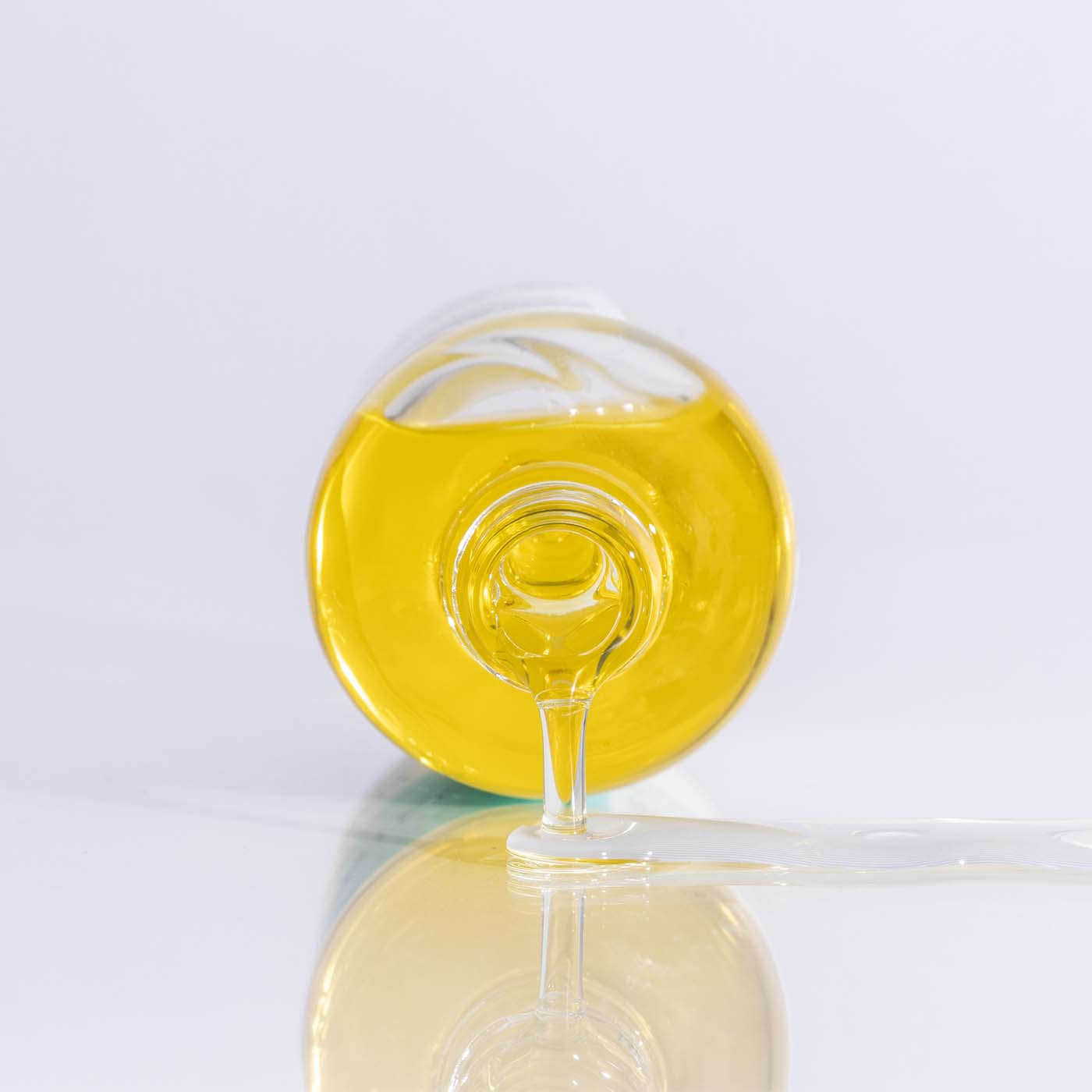
In the world of skincare, brands love to focus on easily marketed benefits and unique points of difference - meaning there’s generally a huge emphasis on pushing the latest active ingredients: retinol, hyaluronic acid, peptides, antioxidants etc.
However, an often-overlooked but equally if not more critical component of great skincare is the carrier oil. While actives tend to steal the spotlight for their targeted effects, carrier oils serve as the unsung heroes. They’re the backbone of the formulation, often make up the bulk of the raw material present in a product and are crucial to ensuring that your skincare is both effective and beneficial to the skin.
So today we thought we’d take a deep dive into the world of carrier oils -we’ll explore the essential role they play in our own skincare products, from their moisturizing and healing properties to their ability to enhance the efficacy of active ingredients. We'll also look at how we select carrier oils based on skin type and specific outcomes we’re looking for.
What Are Carrier Oils?
Carrier oils are natural, plant-based oils that are typically derived from the fatty parts of plants, such as seeds, kernels, or nuts. These oils are called "carrier" oils because they serve to carry or dilute more potent substances like essential oils, which may be too strong to apply directly to the skin. However, their role goes beyond just dilution; carrier oils are packed with nutrients, fatty acids, and vitamins that provide deep nourishment to the skin.
Examples of popular carrier oils include:
- Jojoba oil
- Sweet almond oil
- Olive oil
- Grapeseed oil
- Avocado oil
- Sunflower oil
Each of these oils offers unique benefits, making them versatile ingredients that can address a variety of skincare concerns. We’ll drill down into this further in a moment.
Most importantly - not all oils are equal
When it comes to skincare not all oils are equal. When mass producing brands need a cost effective, stable supply chain than can deliver significant quantities of what they require. When you apply this to the carrier oils they choose, we’ll commonly see lower-quality commercial grade oils being used. These are often mass-produced, refined and stripped of many of their natural nutrients through the processing techniques used. The storage conditions of commercial grade oils are also not great - many of these oils can sit for extended period of time in warehouses waiting to be shifted further along the supply chain.
The easiest way to visualise this is to think of a supermarket bought <$10 blended extra virgin olive oil vs an expensive organic, unfiltered Italian olive oil that might be 5 or 10x the price. Just by observing the colour and smell you can tell that one is absolutely nothing like the other. This is reflected in the nutritional profile of the oil as well, where the fresher, higher quality oil will be much richer in polyphenols (the part that makes olive oils healthy) and significantly better for you to eat.
With this in mind, when we look at Carrier oils, we don’t just look at what the need the oil to technically do as a part of the formulation - we also actively look into the origin and quality of the base oil. We focus on hand-selected, single-origin oils from premium growers to maintain their purity and potency. Sourced with care, these oils are cold-pressed and minimally processed, preserving their natural composition. This results in a richer, more effective product that delivers maximum nourishment, hydration, and skin benefits, making a significant difference in the quality of your skincare routine. It’s foundational step behind the philosophy of our brand.
The Science Behind Carrier Oils
With that out of the way - what role do these carrier oils have in our skincare?
Carrier oils contain essential fatty acids (EFAs), which play a critical role in maintaining the integrity of the skin's barrier. EFAs are vital components of cell membranes and are necessary for the production of the skin's natural oils (sebum). The two primary types of fatty acids found in carrier oils are:
- Linoleic Acid (Omega-6): Helps support the skin’s barrier function, reduces water loss, and is especially beneficial for oily and acne-prone skin.
- Oleic Acid (Omega-9): Offers deep moisturizing properties and is particularly suitable for dry or aging skin.
Carrier oils are also rich in vitamins, including Vitamin E (a potent antioxidant), Vitamin A (for skin repair and renewal), and Vitamin K (for reducing dark spots and improving skin elasticity).
Carrier Oils as the Base of Skincare Formulation
Carrier oils provide the essential structure for many skincare products, whether it’s facial oils, moisturizers, serums, or body lotions. Here's how carrier oils contribute to the overall formulation:
1. Hydration and Moisture Retention
One of the primary functions of carrier oils is their ability to hydrate and lock in moisture. Unlike water-based ingredients, oils create a barrier on the skin's surface that prevents moisture loss through transepidermal water loss (TEWL). This is especially crucial for individuals with dry or compromised skin barriers, as it helps to keep the skin supple and soft.
In building our routines we look at the carrier oils we use and how they can most closely resemble the skin’s natural sebum. Our objective is to balancing moisture levels without clogging pores. These oils not only help to seal in hydration but also regulate the skin's oil production, making them suitable for a variety of skin types.
2. Nourishment and Skin Repair
Carrier oils are rich in vitamins, antioxidants, and essential fatty acids, all of which help to nourish the skin and promote skin health. For instance, Sea Buckthorn oil is a popular choice in anti-aging products due to its high concentration of Vitamin A (retinoic acid), which aids in cell turnover and the reduction of fine lines and wrinkles.
Other carrier oils, like avocado oil and olive oil, are known for their deep penetration, making them excellent for repairing and regenerating damaged skin. These oils are especially beneficial for individuals with skin conditions such as eczema, psoriasis, or dry patches, as they provide long-lasting moisture and promote healing.
3. Delivery Mechanism for Active Ingredients
Carrier oils play a vital role in delivering active ingredients to the deeper layers of the skin. Many active compounds, like essential oils or fat-soluble vitamins, require a lipid (fat) base to be effectively absorbed by the skin. Carrier oils create an optimal environment for the skin to absorb these actives, enhancing their efficacy.
For example, most essential oils are highly potent and should never be applied directly to the skin. When diluted in a carrier oil such as sunflower or grapeseed, these essential oils become safe to use on the skin while still offering their therapeutic benefits.
4. Skin Barrier Support
The skin’s outermost layer, known as the stratum corneum, functions as a protective barrier that guards against environmental pollutants, bacteria, and allergens. This barrier is largely made up of lipids, which prevent water loss and maintain the skin’s hydration.
When this barrier is compromised, the skin can become dry, irritated, or more prone to infection. Carrier oils help to restore and reinforce this lipid barrier, supporting the skin’s natural ability to retain moisture and protect itself. Oils rich in linoleic acid, such as grapeseed oil or sunflower oil, are particularly beneficial for strengthening the skin’s barrier and preventing moisture loss.
Customizing Carrier Oils for Different Skin Types
One of the greatest advantages of carrier oils is their diversity. Different carrier oils are suited to different skin types, meaning you can tailor your choice of oil based on your specific skin needs. Here's a breakdown of how we select carrier oils that can be matched to various skin types:
1. For Oily and Acne-Prone Skin
For individuals with oily or acne-prone skin, it might seem counterintuitive to use oils in a skincare routine. However, certain carrier oils can help regulate sebum production and prevent breakouts. Oils high in linoleic acid are particularly beneficial because research suggests that acne-prone skin often lacks sufficient linoleic acid. In developing our Supercharged line we tested multiple varities of high-linoleic acid oils before landing on producer based in Northern New South Wales (Australia) with a unique, cold-pressed, high-linoleic acid variety of Sunflower. We use this oil as a base for our oily-skin cleansing & treatment oils - it’s lightweight, fast-absorbing, non-comedogenic, whilst being super rich in Vitamin E.
2. For Dry Skin
Dry skin needs carrier oils that are high in oleic acid. Oleic acid offers rich, deep moisture to help restore the skin's suppleness. For example, with our Next Level cleanser we focused on a rich, organic avocado oil as the primary means of boosting oleic acid. We balanced this with a lighter weight, organic grapeseed oil to offset any heaviness in the cleansing oil.
3. Mature Skin
For our mature skin we wanted to focus on really unique and luxurious carrier oils that could also support a higher % of actives. We selected 2 very special oils to form the basis of our formulations - cold pressed sandalwood seed oil for our Velvet cleanser and a macerated Kakadu Plum oil for our Bounce treatment oil. We balanced with Sunflower, Grapeseed and Jojoba oils to better balance the lipid profiles of the oils and help with absorption & application.
The Unsung Heroes of Skincare
Carrier oils are the backbone of many great skincare products, providing hydration, nourishment, and support for the skin’s natural functions. While active ingredients often get all the attention, it’s the carrier oils that deliver these actives where they need to go and ensure that the skin remains balanced and healthy. Hopefully this gives you a better understanding of the role these oils play in our products - and why they’re so great for your skin.
